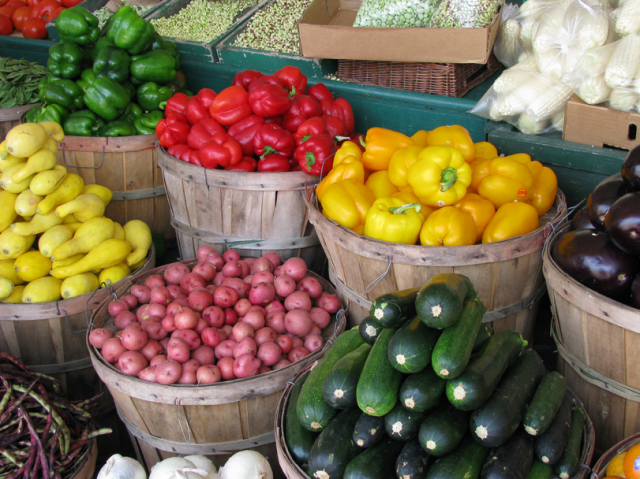 When my second son was born he cried nearly every time I put him in the car seat. Wait, that’s not right, he SCREAMED nearly every time I put him in the car seat. When I was pregnant with my third son, I decided to change some things in order to make those first several months with a newborn more livable. The last thing I wanted to do, for example, was drag two toddlers and an infant into the grocery store or make any solo late night trips. To make my life easier, I signed up for a food delivery service.
When my second son was born he cried nearly every time I put him in the car seat. Wait, that’s not right, he SCREAMED nearly every time I put him in the car seat. When I was pregnant with my third son, I decided to change some things in order to make those first several months with a newborn more livable. The last thing I wanted to do, for example, was drag two toddlers and an infant into the grocery store or make any solo late night trips. To make my life easier, I signed up for a food delivery service.
As I was researching which company to work with I found out that not all delivery services are created equal. I wanted organic fruits and vegetables, vegetarian friendly food, and free-range eggs. Plus, I loved the idea of supporting a local organic farm, one that is sustainable and concerned about their impact on our environment.
There are many benefits to buying food locally. For one, food grown locally is picked at its peak flavor time because it can get from farm to table quickly versus food that has to be picked early to travel long distances, which requires a longer shelf life. Not only is local food fresher but it also retains more vitamins and minerals.
Another reason to buy local is the humane treatment of the animals. I’m sure not all local, organic farms adhere to a strict free-range, compassionate care policy but most are better than the large corporate factory farms that are all about the bottom line. Unfortunately, most animals are raised in these extremely confined and horrific factories that are not only abusive to the animals but they’re also contributing waste, run-off antibiotics and hormones, and pesticides into the earth. They are polluting the soil, air and surrounding wildlife and destroying the environment. This food is then packed up and driven long distances thus creating harmful green house gas emissions. According to the National Sustainable Agriculture Information Service, “Through its emphasis on high production, the industrial model has degraded soil and water, reduced the biodiversity that is a key element to food security, increased our dependence on imported oil, and driven more and more acres into the hands of fewer and fewer “farmers,” crippling rural communities.”
Buying local supports the famer and the farmer’s family as well as all of the workers and their families in a fair trade environment. Those dollars then go back into the community. How fantastic for the rural economy! Farmers tend to live on the land they are working so hard to preserve. According to sustainabletable.org, “By being good stewards of the land, seeking out local markets, minimizing packaging, and harvesting food only when it is ready to consume, farmers can significantly reduce their environmental impact. In fact, studies show that sustainable agricultural practices can actually increase food production by up to 79% while at the same time actively reducing the effects of farming on climate change through carbon sequestration.” Also, buying local means you know where all of your food came from and how it was grown and raised. You could literally shake the hand of the men and women who grew your food if you so desired.
So how does it work? Most home delivery services have a website that you can go on to read about the company, the farms and farmers, and the organic food that they offer. In many cases, you can place your order on line and have it delivered to your door weekly. The place my family chose had an option of ordering a la carte or you could get their “boxes,” which included a mixture of items. We ordered the vegetable box and the fruit box. Every week we would excitedly open up our boxes to find items that sometimes we never heard of. “Hmm, what is chard and what do we do with it?” It was fun to learn new recipes and try out new foods that we wouldn’t have purchased otherwise.
Now, if you like to handle and squeeze your own fruit and vegetables as some people do, then a home delivery service is not for you because you get what you get and you don’t get upset (sorry, I have kids). But fear not because you can still buy local and support your community. Farmers’ Markets, natural grocery stores and food co-ops, family farms and some restaurants are all other ways to eat locally.
A really cool website to check out is: localharvest.org. You can plug in your zip code and find sustainably grown food in your area. I’ve used this website to find some fantastic restaurants like The Star Grazer Café, which only uses all local ingredients and they even make all of their food from scratch!
Another fantastic website is the Eat Well Guide at: eatwellguide.org. You can search by location, keyword or category to find sustainably grown, local and organic food in your area. This website even lists educational centers, bakers, caterers, personal chefs, and organizations that support the local movement. I can’t wait to try out Boocoo, a coffee shop I found on this site that serves nothing but organic fair trade coffee!
Eating locally is as easy as plugging a zip code into your smart phone to find where to go. I’m not arguing that all food consumed should be locally grown organic sustenance. What I am saying is that we should all try to make a little bit of an effort to support this cause. Go Locavore, even for just a shopping trip or a cup of Joe.







Informative and a joy to read! An additional benefit, I tend to find the organic produce pricing to be competitive against a Whole Foods!
Going to a Farmers’ Market in the summer is one of my favorite family activities! I love buying directly from the grower!
Great article. Last fall I did a vege share from Sandhill Organics that I picked up at a church in Glenview. I thought it was fun to try all the new vegetables also.
Very informative. I have been thinking about exploring this option for a while now and did not know where to start. I would like to be supportive to the local growers.
Great article and great idea. I was shopping at our Farmers Market until we found out most weren’t actually local or organic. You have to double check. After some complaints there ended up being only 1 that was organic. I shop at a local store and pay more because I value the store being in our town especially since I can walk there.
Another very well written article by Wendy Altschuler. I will consider your suggestion to buy local and to buy from farmers’ markets. I already buy organic produce. On a different note, my compliments go to Kimberly, whose time machine allowed her to make her 5:44pm comment three-and-a-half hours early!
@Tammy, is Sandhill Organics the one out of Prairie Crossing? How fantastic that you support community agriculture and vege sharing! I love that community!
@Robin, check out those websites listed in the article. They’re great for finding out where to go and how to start.
@Kimberly, great suggestion to double check if what you’re buying is in fact locally grown organic food. I love that you support your local store. I agree that it’s worth a few more pennies to support the little guy (esp. if you can walk there).
@UM, I’m glad that you’re inspired to buy more locally grown organic food. Happy shopping! 🙂
Thank you for the great information Wendy! I will check out the websites you mention. I definitely like to support local farms.
@Yvonne, I’m glad you liked the article, thanks for reading! I hope you find some valuable information on those sites! Good luck!
I wasn’t hungry until I read your article.
This really is important stuff for all the reasons you note. Our fuel prices are an anomaly – much lower than nearly everywhere else. They’ve risen about $.60 in past weeks and we can expect that fuel will always be more expensive than in the past, which will make locally grown produce less expensive than food that travels long distances. More, I like the idea of supporting local businesses.
Thanks for your thought provoking piece.
Rising fuel prices are definitely something to think about when choosing where we shop and give our dollars. Wouldn’t it be great if rising costs forced big grocers to be more green and look for other, more efficient ways to produce, package, and ship food? Food for thought?
Great article. Loved the detail and the e-net leads. Thanks!
Wonderful piece!!! Because we spend time in Michigan we are big supporters of local farmers and we buy our produce directly from them. Many times just when the product has been picked.
It’s a beautiful thing. Growing something in the ground and feeding people! Its just wonderful.
Love the article!
@Jim, thanks for reading and joining the discussion!
@Stac, good for you for buying direct! It doesn’t get more fresh than that!
Great Article. Support your local growers!
@Ted, Thanks for reading and supporting local growers!
Right on!